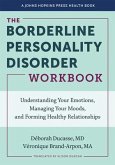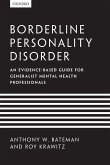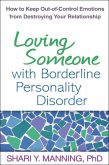Roy Krawitz (therapist Psychiatrist and consultant in the area of, Wendy Jackson (Mental health promoter, Mental Health Foundation, Au
Borderline Personality Disorder
23,99 €
inkl. MwSt.
Versandfertig in 2-4 Wochen

12 °P sammeln
Roy Krawitz (therapist Psychiatrist and consultant in the area of, Wendy Jackson (Mental health promoter, Mental Health Foundation, Au
Borderline Personality Disorder
- Broschiertes Buch
- Merkliste
- Auf die Merkliste
- Bewerten Bewerten
- Teilen
- Produkt teilen
- Produkterinnerung
- Produkterinnerung
This book provides people with borderline personality disorder and their families and friends with a user friendly but authoritative guide to the condition. The book not only includes information about the disorder and how it is diagnosed, but also looks in depth at treatment and recovery strategies.
Andere Kunden interessierten sich auch für
![The Borderline Personality Disorder Workbook The Borderline Personality Disorder Workbook]() Deborah DucasseThe Borderline Personality Disorder Workbook30,99 €
Deborah DucasseThe Borderline Personality Disorder Workbook30,99 €![Borderline Personality Disorder Borderline Personality Disorder]() Anthony W. Bateman (Consultant Psychiatrist and Ba PsychotherapistBorderline Personality Disorder50,99 €
Anthony W. Bateman (Consultant Psychiatrist and Ba PsychotherapistBorderline Personality Disorder50,99 €![Loving Someone with Borderline Personality Disorder Loving Someone with Borderline Personality Disorder]() Shari Y. Manning (United States private practice)Loving Someone with Borderline Personality Disorder29,99 €
Shari Y. Manning (United States private practice)Loving Someone with Borderline Personality Disorder29,99 €![The Routledge Handbook of Attachment The Routledge Handbook of Attachment]() The Routledge Handbook of Attachment56,99 €
The Routledge Handbook of Attachment56,99 €![Understanding the Effects of Child Sexual Abuse Understanding the Effects of Child Sexual Abuse]() Sam Warner (UK Manchester Metropolitan University)Understanding the Effects of Child Sexual Abuse61,99 €
Sam Warner (UK Manchester Metropolitan University)Understanding the Effects of Child Sexual Abuse61,99 €![Understanding and Treating Dissociative Identity Disorder Understanding and Treating Dissociative Identity Disorder]() Elizabeth F. Howell (International Society for the Study of DissociUnderstanding and Treating Dissociative Identity Disorder68,99 €
Elizabeth F. Howell (International Society for the Study of DissociUnderstanding and Treating Dissociative Identity Disorder68,99 €![Dramatherapy and Destructiveness Dramatherapy and Destructiveness]() Dramatherapy and Destructiveness60,99 €
Dramatherapy and Destructiveness60,99 €-
-
-
This book provides people with borderline personality disorder and their families and friends with a user friendly but authoritative guide to the condition. The book not only includes information about the disorder and how it is diagnosed, but also looks in depth at treatment and recovery strategies.
Hinweis: Dieser Artikel kann nur an eine deutsche Lieferadresse ausgeliefert werden.
Hinweis: Dieser Artikel kann nur an eine deutsche Lieferadresse ausgeliefert werden.
Produktdetails
- Produktdetails
- The Facts
- Verlag: Oxford University Press
- Seitenzahl: 288
- Erscheinungstermin: Januar 2008
- Englisch
- Abmessung: 197mm x 132mm x 17mm
- Gewicht: 305g
- ISBN-13: 9780199202966
- ISBN-10: 0199202966
- Artikelnr.: 23168493
- Herstellerkennzeichnung
- Libri GmbH
- Europaallee 1
- 36244 Bad Hersfeld
- gpsr@libri.de
- The Facts
- Verlag: Oxford University Press
- Seitenzahl: 288
- Erscheinungstermin: Januar 2008
- Englisch
- Abmessung: 197mm x 132mm x 17mm
- Gewicht: 305g
- ISBN-13: 9780199202966
- ISBN-10: 0199202966
- Artikelnr.: 23168493
- Herstellerkennzeichnung
- Libri GmbH
- Europaallee 1
- 36244 Bad Hersfeld
- gpsr@libri.de
Roy Krawitz is Consultant Psychiatrist and Psychotherapist with 25 years' experience in treating patients with borderline personality disorder as therapist, consultant, trainer, researcher and scientific author. Roy has provided borderline personality disorder therapy (DBT, psychodynamic and supportive psychotherapy) in a wide variety of healthcare settings. His published scientific research includes the effectiveness of therapy, the DBT program he leads and his borderline personality disorder training for professionals. This is Roy's fourth published book on borderline personality disorder, one of which (published by Oxford University Press) has also been translated and published in Dutch and Japanese. Wendy Jackson is currently employed as a mental health promoter for a national mental health organization, and is a freelance health auditor, quality manager and consumer advisor. Wendy is an ex-consumer of services for people with borderline personality disorder, having benefited from treatment implemented across inpatient, community and crisis services, and now has a robust history of recovery from borderline personality disorder. In her role as consumer consultant, Wendy has been actively involved in the setting up and delivery of treatment plans, running skills training and support groups for clients with borderline personality disorder and delivering borderline personality disorder training to professionals.
* Borderline Personality Disorder
* 1: History
* 2: How many people have borderline personality disorder?
* 3: What is borderline personality disorder?
* 4: Understanding borderline personality disorder
* 5: Other problems or diagnoses found in association with borderline
personality disorder
* 6: What causes borderline personality disorder?
* 7: Understanding self-harm
* 8: Prognosis: do people with borderline personality disorder get
better?
* 9: Is treatment effective?
* Recovery frameworks
* 10: Change
* 11: Psychological treatments
* 12: What to expect from the treatment
* 13: First contact with health professionals
* 14: Choosing a therapist
* 15: Developing a therapy agreement
* 16: Support network
* 17: Assessment
* 18: Treatment goals and treatment plan
* 19: Therapy relationship
* 20: Taking charge of your recovery
* 21: Power struggles and beyond
* 22: Prioritising your therapy focus
* 23: Preparation for crises
* 24: Medication
* 25: Hospitalisation
* Recovery specifics
* 26: Is it our awareness that makes a difference?
* 27: Is it what we do that makes a difference?
* 28: Is it what we think that makes a difference?
* 29: Is it what we feel that makes a difference?
* 30: Is it what we do with emotions of anger, guilt and regret that
makes a difference?
* 31: Is it what we do with impulsive urges that makes a difference?
* 32: Is it taking charge of our personal boundaries that makes a
difference?
* 33: Is it how we clarify our values and identity that makes a
difference?
* 34: Is it how we relate to ourselves that makes a difference?
* 35: Is it how we relate to others that makes a difference?
* 36: Is it how we create pleasure that makes a difference?
* 37: Is it how we deal with 'flashbacks' that makes a difference?
* 38: Is it how we deal with crises that makes a difference?
* 39: Is it how we deal with our physical health that makes a
difference?
* 40: Is it how we deal with something 'larger than ourselves' that
makes a difference?
* 41: Notes to family and friends
* 42: Concluding comments
* 1: History
* 2: How many people have borderline personality disorder?
* 3: What is borderline personality disorder?
* 4: Understanding borderline personality disorder
* 5: Other problems or diagnoses found in association with borderline
personality disorder
* 6: What causes borderline personality disorder?
* 7: Understanding self-harm
* 8: Prognosis: do people with borderline personality disorder get
better?
* 9: Is treatment effective?
* Recovery frameworks
* 10: Change
* 11: Psychological treatments
* 12: What to expect from the treatment
* 13: First contact with health professionals
* 14: Choosing a therapist
* 15: Developing a therapy agreement
* 16: Support network
* 17: Assessment
* 18: Treatment goals and treatment plan
* 19: Therapy relationship
* 20: Taking charge of your recovery
* 21: Power struggles and beyond
* 22: Prioritising your therapy focus
* 23: Preparation for crises
* 24: Medication
* 25: Hospitalisation
* Recovery specifics
* 26: Is it our awareness that makes a difference?
* 27: Is it what we do that makes a difference?
* 28: Is it what we think that makes a difference?
* 29: Is it what we feel that makes a difference?
* 30: Is it what we do with emotions of anger, guilt and regret that
makes a difference?
* 31: Is it what we do with impulsive urges that makes a difference?
* 32: Is it taking charge of our personal boundaries that makes a
difference?
* 33: Is it how we clarify our values and identity that makes a
difference?
* 34: Is it how we relate to ourselves that makes a difference?
* 35: Is it how we relate to others that makes a difference?
* 36: Is it how we create pleasure that makes a difference?
* 37: Is it how we deal with 'flashbacks' that makes a difference?
* 38: Is it how we deal with crises that makes a difference?
* 39: Is it how we deal with our physical health that makes a
difference?
* 40: Is it how we deal with something 'larger than ourselves' that
makes a difference?
* 41: Notes to family and friends
* 42: Concluding comments
* Borderline Personality Disorder
* 1: History
* 2: How many people have borderline personality disorder?
* 3: What is borderline personality disorder?
* 4: Understanding borderline personality disorder
* 5: Other problems or diagnoses found in association with borderline
personality disorder
* 6: What causes borderline personality disorder?
* 7: Understanding self-harm
* 8: Prognosis: do people with borderline personality disorder get
better?
* 9: Is treatment effective?
* Recovery frameworks
* 10: Change
* 11: Psychological treatments
* 12: What to expect from the treatment
* 13: First contact with health professionals
* 14: Choosing a therapist
* 15: Developing a therapy agreement
* 16: Support network
* 17: Assessment
* 18: Treatment goals and treatment plan
* 19: Therapy relationship
* 20: Taking charge of your recovery
* 21: Power struggles and beyond
* 22: Prioritising your therapy focus
* 23: Preparation for crises
* 24: Medication
* 25: Hospitalisation
* Recovery specifics
* 26: Is it our awareness that makes a difference?
* 27: Is it what we do that makes a difference?
* 28: Is it what we think that makes a difference?
* 29: Is it what we feel that makes a difference?
* 30: Is it what we do with emotions of anger, guilt and regret that
makes a difference?
* 31: Is it what we do with impulsive urges that makes a difference?
* 32: Is it taking charge of our personal boundaries that makes a
difference?
* 33: Is it how we clarify our values and identity that makes a
difference?
* 34: Is it how we relate to ourselves that makes a difference?
* 35: Is it how we relate to others that makes a difference?
* 36: Is it how we create pleasure that makes a difference?
* 37: Is it how we deal with 'flashbacks' that makes a difference?
* 38: Is it how we deal with crises that makes a difference?
* 39: Is it how we deal with our physical health that makes a
difference?
* 40: Is it how we deal with something 'larger than ourselves' that
makes a difference?
* 41: Notes to family and friends
* 42: Concluding comments
* 1: History
* 2: How many people have borderline personality disorder?
* 3: What is borderline personality disorder?
* 4: Understanding borderline personality disorder
* 5: Other problems or diagnoses found in association with borderline
personality disorder
* 6: What causes borderline personality disorder?
* 7: Understanding self-harm
* 8: Prognosis: do people with borderline personality disorder get
better?
* 9: Is treatment effective?
* Recovery frameworks
* 10: Change
* 11: Psychological treatments
* 12: What to expect from the treatment
* 13: First contact with health professionals
* 14: Choosing a therapist
* 15: Developing a therapy agreement
* 16: Support network
* 17: Assessment
* 18: Treatment goals and treatment plan
* 19: Therapy relationship
* 20: Taking charge of your recovery
* 21: Power struggles and beyond
* 22: Prioritising your therapy focus
* 23: Preparation for crises
* 24: Medication
* 25: Hospitalisation
* Recovery specifics
* 26: Is it our awareness that makes a difference?
* 27: Is it what we do that makes a difference?
* 28: Is it what we think that makes a difference?
* 29: Is it what we feel that makes a difference?
* 30: Is it what we do with emotions of anger, guilt and regret that
makes a difference?
* 31: Is it what we do with impulsive urges that makes a difference?
* 32: Is it taking charge of our personal boundaries that makes a
difference?
* 33: Is it how we clarify our values and identity that makes a
difference?
* 34: Is it how we relate to ourselves that makes a difference?
* 35: Is it how we relate to others that makes a difference?
* 36: Is it how we create pleasure that makes a difference?
* 37: Is it how we deal with 'flashbacks' that makes a difference?
* 38: Is it how we deal with crises that makes a difference?
* 39: Is it how we deal with our physical health that makes a
difference?
* 40: Is it how we deal with something 'larger than ourselves' that
makes a difference?
* 41: Notes to family and friends
* 42: Concluding comments







